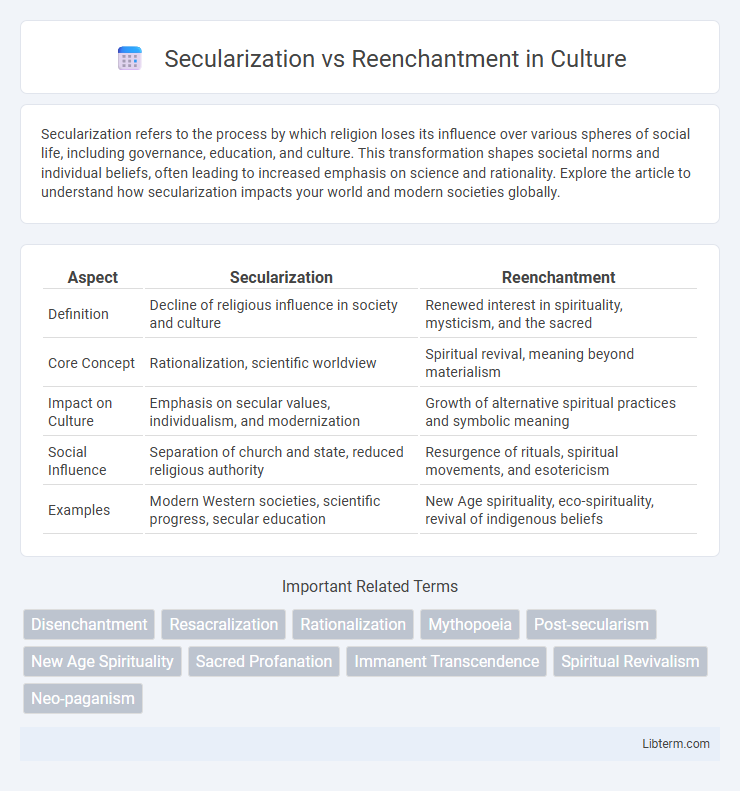Secularization refers to the process by which religion loses its influence over various spheres of social life, including governance, education, and culture. This transformation shapes societal norms and individual beliefs, often leading to increased emphasis on science and rationality. Explore the article to understand how secularization impacts your world and modern societies globally.
Table of Comparison
| Aspect | Secularization | Reenchantment |
|---|---|---|
| Definition | Decline of religious influence in society and culture | Renewed interest in spirituality, mysticism, and the sacred |
| Core Concept | Rationalization, scientific worldview | Spiritual revival, meaning beyond materialism |
| Impact on Culture | Emphasis on secular values, individualism, and modernization | Growth of alternative spiritual practices and symbolic meaning |
| Social Influence | Separation of church and state, reduced religious authority | Resurgence of rituals, spiritual movements, and esotericism |
| Examples | Modern Western societies, scientific progress, secular education | New Age spirituality, eco-spirituality, revival of indigenous beliefs |
Understanding Secularization: Definitions and Origins
Secularization refers to the process by which religion loses social, cultural, and political influence in society, leading to a decline in religious beliefs and practices. Originating from sociological theories by Max Weber and Emile Durkheim, secularization emphasizes the shift towards rationalization and scientific understanding over supernatural explanations. Understanding secularization involves examining its impact on modernity, institutional religion, and individual worldview transformations.
Theories Behind Secularization
Secularization theories emphasize the decline of religious authority and influence in modern societies, attributing this shift to rationalization, scientific progress, and industrialization. Key thinkers like Max Weber argued that disenchantment results from the systematic application of reason, reducing the social significance of religious beliefs. However, contrasting perspectives highlight ongoing forms of reenchantment through spirituality and renewed religious expressions in contemporary culture.
Forces Driving Secularization in Modern Societies
Modern societies experience secularization driven by scientific advancements, technological progress, and increasing emphasis on rationality and empirical evidence. Urbanization and education promote individualism and diminish traditional religious authority, fostering a decline in religious beliefs and practices. Media influence and pluralistic cultural encounters further challenge established religious norms, accelerating the process of secularization.
The Concept of Reenchantment: An Overview
The concept of reenchantment challenges the traditional secularization thesis by emphasizing a resurgence of spiritual, mystical, and supernatural beliefs in modern society. It reflects a cultural shift where scientific rationalism is complemented or replaced by renewed interest in symbols, rituals, and transcendence. Reenchantment highlights how contemporary movements such as neo-paganism, spirituality, and alternative medicine contribute to a pluralistic understanding of meaning beyond purely secular frameworks.
Major Thinkers on Reenchantment
Major thinkers on reenchantment, such as Max Weber and Charles Taylor, emphasize the resurgence of spirituality and meaning in modern society despite secularization trends. Weber's concept of "disenchantment" highlights rationalization, whereas Taylor explores the "immanent frame" allowing for new forms of religiosity and spiritual experiences. Contemporary scholars like Bruno Latour advocate for a "pluralism" that reintroduces diverse spiritual and ecological values into the secular public sphere.
Secularization vs Reenchantment: Key Differences
Secularization refers to the decline of religious influence and the rise of rational, scientific explanations in society, emphasizing empirical evidence and separation of religion from public life. Reenchantment, by contrast, involves a resurgence or renewed interest in spirituality, mysticism, and symbolic meaning, often as a response to the perceived disenchantment caused by modernization. The key differences lie in secularization's focus on secular, scientific worldviews versus reenchantment's embrace of spirituality and supernatural elements to reintroduce meaning and connection.
Cultural and Social Impacts of Secularization
Secularization significantly transforms cultural norms by reducing the dominance of religious values and rituals in everyday life, leading to increased emphasis on scientific reasoning and individual autonomy. Social structures shift as institutions such as education, law, and politics become more secular, fostering pluralism and diverse belief systems within communities. This transition often results in a redefinition of identity and community cohesion, with secular values promoting inclusivity but occasionally sparking tensions over traditional religious roles.
Manifestations of Reenchantment in Contemporary Life
Manifestations of reenchantment in contemporary life include the resurgence of spiritual practices such as mindfulness meditation, astrology, and alternative healing therapies, which offer personalized meaning beyond traditional religious frameworks. The growing popularity of immersive experiences like virtual reality and fantasy literature reflects a collective yearning for mystery and wonder in an increasingly rationalized world. Festivals, rituals, and community-driven movements that emphasize connection to nature and the sacred illustrate a cultural shift toward revaluing enchantment within secular societies.
Global Perspectives: Secularization and Reenchantment Across Cultures
Secularization and reenchantment manifest diversely across global cultures, reflecting varying historical, religious, and social contexts. In Western societies, secularization often correlates with scientific rationalism and diminished religious authority, while many non-Western cultures experience a simultaneous rise in spiritual practices and reenchantment as forms of cultural identity and resistance. Comparative studies highlight how globalization, modernization, and indigenous traditions shape complex interactions between secular and sacred worldviews worldwide.
Future Trends: Will Societies Secularize or Reenchant?
Future trends in secularization versus reenchantment suggest a complex interplay between technological advancement and spiritual resurgence. Emerging data indicate growing interest in alternative spiritualities, driven by digital communities and ecological concerns, challenging traditional secular frameworks. Sociological projections reveal that while formal secularization may continue in institutional contexts, personalized reenchantment actively reshapes cultural narratives and individual identities worldwide.
Secularization Infographic

 libterm.com
libterm.com